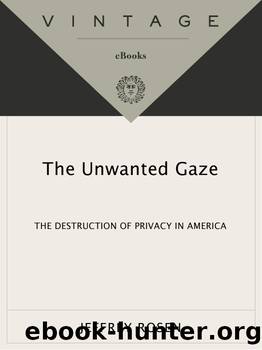The Unwanted Gaze by Jeffrey Rosen

Author:Jeffrey Rosen [Rosen, Jeffrey]
Language: eng
Format: epub
ISBN: 978-0-307-76660-1
Publisher: Knopf Doubleday Publishing Group
Published: 2011-04-20T00:00:00+00:00
Chapter 5
ââ
Privacy in Cyberspace
In 1998, the dean of the Harvard Divinity School was forced to resign after he downloaded pornography on his home computer. The dean had asked a Harvard technician to bring a computer with more memory to his official residence, and in the course of transferring files from the old computer to the new one, the technician noticed that the dean had saved thousands of pornographic pictures. Although none of the pictures appeared to involve minors, the technician told his supervisor, and word eventually filtered up to the president of Harvard, who asked the dean to step down.
When the story broke several months later, Harvard justified its decision to force out the dean by noting that the rules of the Divinity School prohibit the personal use of university computers in ways that clash with the schoolâs educational mission. More specifically, the rules forbid the âintroductionâ of material that is âinappropriate, obscene, bigoted or abusiveâ into the educational environment.1 But the dean was at home, not at school, and the fact that the university owned his computer and his house hardly settles the question of whether his personal browsing was anyone elseâs business. If the dean had made long-distances calls to his mistress on a Harvard-owned telephone, most people would consider university monitoring of his conversations an unsettling invasion of privacy. And although private universities arenât formally required to respect the First Amendment, it would be hard to imagine Harvard forbidding members of the Faculty of Arts and Sciences from downloading âinappropriateâ material in their own homes, even on university-owned computers. If the dean had been an aficionado of Snoop Doggy Dogg, no one would have suggested he should be fired for downloading gangsta rap.
The best defense of Harvardâs decision is one that university officials never made openly: divinity schools, perhaps, are different from law schools. The dean was an ordained minister in the Lutheran Church of America, which has issued a pastoral statement condemning the consumption of pornography as a misuse of sexuality, a form of self-degradation that violates the more general proscription of sexual relations outside of marriage. The Harvard Divinity School, however, is not a seminary, and itâs not clear that secular universities should be in the business of disciplining faculty for breaching their sectarian commitments.
Moreover, the rise of cyberspace has blurred the distinction between home and office, as faculty increasingly use university-owned computers and networks at home as well as at work. Iâm at home, for example, as I type these words, but the computer on which Iâm typing is owned by the law school where I teach, as is the network that supplies my e-mail and Internet access. I would be appalled if anyone suggested that the provision of these research tools gave my law school the right to monitor everything I read and write. Twenty-four-hour surveillance may be appropriate in a company town, but it threatens the central purpose of a university: to promote freedom of thought. And even in a company town, there should be some zones of privacy from corporate scrutiny.
Download
This site does not store any files on its server. We only index and link to content provided by other sites. Please contact the content providers to delete copyright contents if any and email us, we'll remove relevant links or contents immediately.
| Automotive | Engineering |
| Transportation |
Whiskies Galore by Ian Buxton(42002)
Introduction to Aircraft Design (Cambridge Aerospace Series) by John P. Fielding(33125)
Small Unmanned Fixed-wing Aircraft Design by Andrew J. Keane Andras Sobester James P. Scanlan & András Sóbester & James P. Scanlan(32797)
Craft Beer for the Homebrewer by Michael Agnew(18240)
Turbulence by E. J. Noyes(8042)
The Complete Stick Figure Physics Tutorials by Allen Sarah(7370)
The Thirst by Nesbo Jo(6937)
Kaplan MCAT General Chemistry Review by Kaplan(6930)
Bad Blood by John Carreyrou(6617)
Modelling of Convective Heat and Mass Transfer in Rotating Flows by Igor V. Shevchuk(6435)
Learning SQL by Alan Beaulieu(6284)
Weapons of Math Destruction by Cathy O'Neil(6271)
Man-made Catastrophes and Risk Information Concealment by Dmitry Chernov & Didier Sornette(6014)
Digital Minimalism by Cal Newport;(5752)
Life 3.0: Being Human in the Age of Artificial Intelligence by Tegmark Max(5552)
iGen by Jean M. Twenge(5410)
Secrets of Antigravity Propulsion: Tesla, UFOs, and Classified Aerospace Technology by Ph.D. Paul A. Laviolette(5371)
Design of Trajectory Optimization Approach for Space Maneuver Vehicle Skip Entry Problems by Runqi Chai & Al Savvaris & Antonios Tsourdos & Senchun Chai(5067)
Pale Blue Dot by Carl Sagan(5003)
